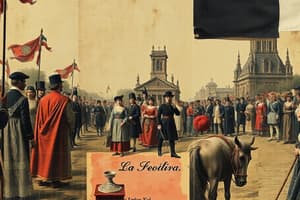Podcast
Questions and Answers
Which of the following best describes the composition of the Third Estate in pre-revolutionary France?
Which of the following best describes the composition of the Third Estate in pre-revolutionary France?
- Members of the clergy (the Church).
- The King and his immediate family.
- Peasants, commoners, and the bourgeoisie. (correct)
- The nobility and aristocracy.
The Estates General was convened by King Louis XVI primarily to:
The Estates General was convened by King Louis XVI primarily to:
- Celebrate his coronation anniversary with representatives from all estates.
- Formally dissolve the three estates and establish a new social order.
- Approve his decision to engage in foreign wars.
- Address the escalating economic crisis in France. (correct)
Which of the following factors was NOT a significant cause of the French Revolution?
Which of the following factors was NOT a significant cause of the French Revolution?
- Heavy taxation and financial burden on the Third Estate.
- The successful economic reforms implemented by King Louis XVI. (correct)
- Enlightenment ideals promoting liberty and equality.
- Widespread social inequality and resentment towards the aristocracy.
What was the Reign of Terror, and which group was primarily responsible for it?
What was the Reign of Terror, and which group was primarily responsible for it?
The execution of King Louis XVI in January 1793 directly signified:
The execution of King Louis XVI in January 1793 directly signified:
Which of the following best characterizes the social and economic conditions in France before the revolution?
Which of the following best characterizes the social and economic conditions in France before the revolution?
What lasting impact did the French Revolution have on France and the world?
What lasting impact did the French Revolution have on France and the world?
How did the rise of Napoleon Bonaparte relate to the French Revolution?
How did the rise of Napoleon Bonaparte relate to the French Revolution?
Flashcards
Three Estates
Three Estates
The social divisions in pre-revolutionary France consisting of the clergy, nobility, and commoners.
Taille
Taille
A land tax imposed on the common people in France before the revolution.
Estates General
Estates General
A legislative assembly in France that represented the three estates, convened by King Louis XVI in 1789.
Reign of Terror
Reign of Terror
A period of extreme violence during the French Revolution led by the Jacobins against perceived enemies.
Signup and view all the flashcards
Execution of King Louis XVI
Execution of King Louis XVI
King Louis XVI was guillotined by the National Assembly in January 1793 for treason.
Signup and view all the flashcards
Living Conditions Before the Revolution
Living Conditions Before the Revolution
Marked by inequality, with privileges for nobility and hardships for the commoners.
Signup and view all the flashcards
Consequences of the Revolution
Consequences of the Revolution
The revolution led to the rise of Napoleon, abolition of monarchy, and new ideals of liberty, equality, and fraternity.
Signup and view all the flashcards
Principles of the Revolution
Principles of the Revolution
Liberty, equality, and fraternity became central tenets of French identity after the revolution.
Signup and view all the flashcardsStudy Notes
The French Revolution: Causes, Events, and Consequences
- The French Revolution was a period of significant political and social change in France.
- The revolution challenged the existing social order and sought a more just and equitable society.
The Three Estates
- French society was divided into three estates:
- First Estate: Clergy (members of the Church)
- Second Estate: Nobility
- Third Estate: Peasants and commoners (vast majority)
Taxation and Unrest
- French citizens faced heavy taxation, particularly the "Taille" (land tax)
- Dissatisfaction grew among commoners due to unfair taxation and treatment.
The Estates-General
- The Estates-General was a representative body of delegates from each of the three estates.
- It convened in 1789, called by King Louis XVI to address France's economic crisis.
Causes of the French Revolution
- Poor harvests and rising bread prices led to widespread hardship.
- The Third Estate demanded equality and an end to the privileges of the nobility and clergy.
Events of the French Revolution
- (No specific events listed in the provided text)
The Reign of Terror
- The Jacobins, a radical group, seized power and implemented a violent period.
- Those who opposed the revolution faced severe punishment.
- King Louis XVI was executed for treason.
Living Conditions Before the Revolution
- Significant disparities existed between the estates in terms of privileges and financial burdens.
- Nobility and clergy enjoyed exemptions from taxation.
- Commoners faced heavy financial burdens under the absolute rule of the king.
Consequences of the Revolution
- The revolution led to the rise of Napoleon Bonaparte.
- The monarchy was abolished.
- Principles of liberty, equality, and fraternity became central to France's identity.
- The revolution reshaped the political and social landscape of France and inspired similar movements worldwide.
Studying That Suits You
Use AI to generate personalized quizzes and flashcards to suit your learning preferences.




